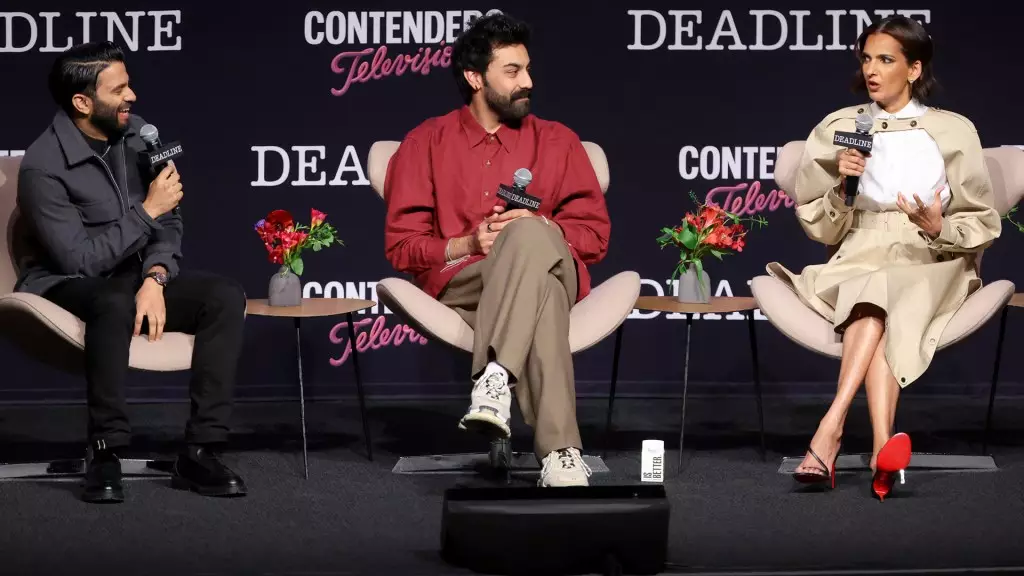The landscape of television is undergoing a significant transformation, particularly when it comes to gender representation. The Hulu series *Deli Boys*, featuring Poorna Jagannathan as the fierce character Lucky Auntie, exemplifies this shift. Traditionally male-dominated roles in crime and drama are now being infused with a new essence by female actors, allowing for a more nuanced exploration of characters that challenge existing norms. Poorna’s portrayal of a multifaceted crime boss encapsulates the celebration of feminine strength, vulnerability, and complexity.
What’s particularly interesting about Jagannathan’s role is the origin story behind Lucky Auntie. Initially intended to be played by a male actor, the character evolved into a powerful woman thanks to the transformative suggestion of actress Geena Davis. During a discussion on female representation in Hollywood, Davis urged creators to reconsider the gender of their characters and explore what happens when traditional roles are altered. By reimagining Lucky Auntie as a woman, the show opens up a dialogue about gender dynamics and showcases how female characters can wield power without losing their femininity.
The Art of Balancing Brutality and Compassion
Jagannathan’s performance is compelling not only for its bravado but also for the way it intertwines toughness with tenderness. In *Deli Boys*, Lucky Auntie’s character wields weapons with precision while simultaneously nurturing her nephews, illustrating the complexities of maternal instincts that exist alongside fierce independence. Her ability to seamlessly navigate these two extremes provides a refreshing take on the archetype of a crime boss. This duality is a testament to the multi-dimensional nature of women, a portrayal often lacking in the realm of television.
Her co-star Asif Ali’s acknowledgment of the delicacy that Poorna brings to the role emphasizes a critical point: representation is not about one-note characters but rather about showcasing the full spectrum of human experience. Poorna’s ability to embody a powerful crime figure and a caring mother simultaneously contributes to a rich narrative tapestry, where the audience can engage with authentic depictions of womanhood that defy traditional stereotypes.
Challenging Stereotypes in the Age of Feminism
However, it is essential to address an underlying issue in the portrayal of characters like Lucky Auntie—the risk of perpetuating stereotypes. While the representation of South Asian women in strong roles is commendable, there is a fine line between empowerment and cliché. The character’s nurturing side might evoke the notion of the “exotic matriarch,” which could inadvertently reduce a richly crafted character to a mere trope. The challenge lies in ensuring that these characters are fully realized beings, rather than symbols.
Poorna Jagannathan skillfully avoids this pitfall through her layered performance. By emphasizing the character’s multifaceted nature, she dismantles the notion that a female character must conform to singular identities. The action-packed narrative that features her character fighting adversaries while also injecting warmth into interactions with her family pushes back against the limitations imposed by conventional roles. This approach is crucial in a time when the push for nuanced representation of women in media is more pressing than ever.
Cultural Relevance in a Global Context
With the increasing visibility of South Asian representation on screen, *Deli Boys* stands out not just for its bold characters but also for its cultural significance. The global audience is increasingly seeking stories that resonate across ethnicities and backgrounds. By stepping into the shoes of a powerful auntie, Poorna provides an opportunity to discuss themes of family, identity, and cultural expectations within the South Asian community.
As viewers engage with these narratives, they also contribute to a broader understanding of diversity. Lucky Auntie’s multifaceted identity reflects the real-life complexities that individuals face in navigating different cultural and social spheres. It’s a celebration of heritage that refuses to shy away from the realities of contemporary society while remaining engaging and entertaining.
Through this lens, *Deli Boys* and characters like Lucky Auntie become crucial in the movement towards greater equity and representation in the media. With each stride toward inclusivity, the entertainment industry not only acknowledges but also amplifies the diverse tales that shape our world—stories that deserve to be told in vibrant and engaging ways.

